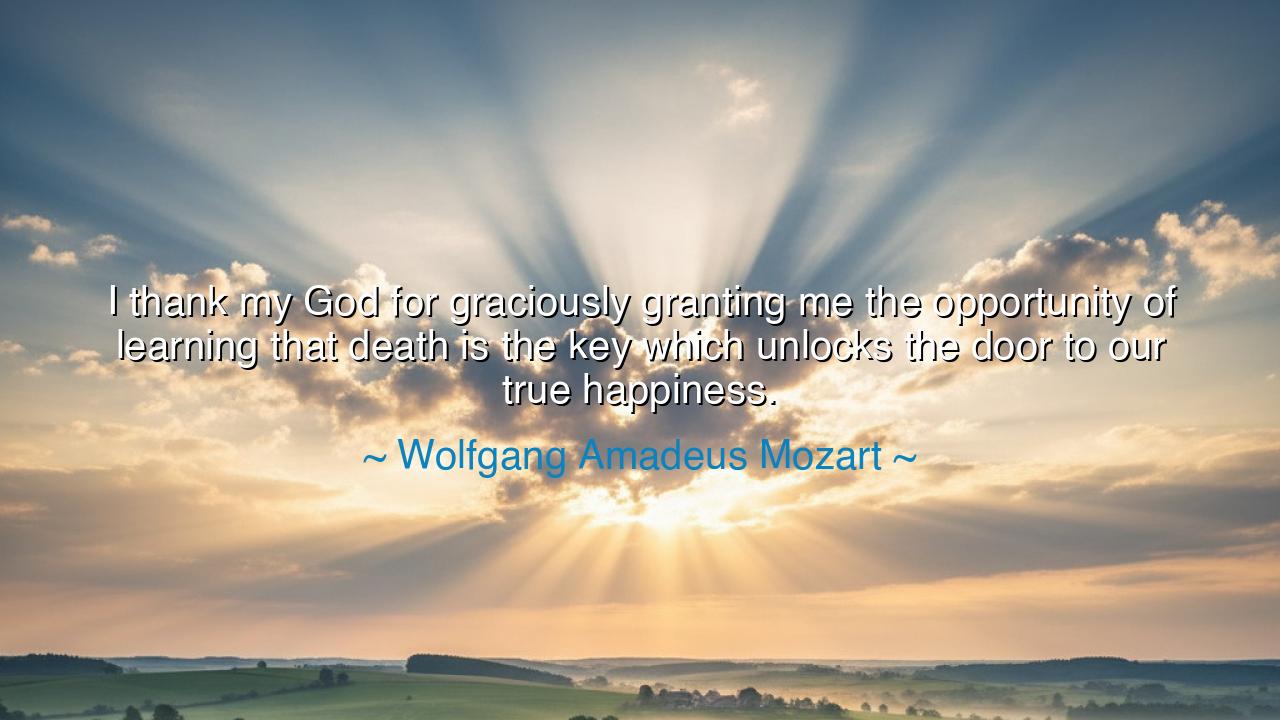
I thank my God for graciously granting me the opportunity of
I thank my God for graciously granting me the opportunity of learning that death is the key which unlocks the door to our true happiness.






“I thank my God for graciously granting me the opportunity of learning that death is the key which unlocks the door to our true happiness.” Thus spoke Wolfgang Amadeus Mozart, the divine composer whose music touched both heaven and earth, and who saw in death not terror, but transcendence. In these solemn words, uttered in the final years of his short but radiant life, Mozart unveiled the wisdom of a soul that had peered beyond the veil of mortality. To him, death was not the end — it was the awakening, the return, the final release into the harmony of eternity.
When Mozart wrote these words, he was already acquainted with the shadow of the grave. Illness haunted his body, poverty pursued his household, and yet, he spoke of death with gratitude, not fear. He had composed the Requiem, that most haunting of hymns, not as a lament, but as a prayer — a conversation between the mortal and the divine. In the melody of that sacred work lies the same truth as in this quote: that death, when understood through faith and serenity, is not a thief but a deliverer. It does not extinguish the light — it opens the door to a greater dawn.
This vision of death as liberation is not born of despair, but of deep spiritual maturity. Many live their lives fleeing the thought of mortality, clutching at the fleeting pleasures of the world, as if to avoid the inevitable is to conquer it. But Mozart — who in his music mirrored the balance of joy and sorrow, of laughter and lament — came to see death as a divine necessity, a bridge between the temporal and the eternal. It was his learning, as he called it — the great revelation granted by the grace of God. He understood that true happiness is not found in the noise and striving of life, but in the peace that comes when the soul is freed from the limits of flesh and time.
So it was with Socrates, the ancient philosopher, who drank the hemlock with calmness and joy. When asked why he did not fear death, he replied, “For either it is a dreamless sleep, or it is the passage of the soul to another place — and in both, there is peace.” Like Mozart, Socrates had learned that death is no enemy to the righteous heart. The wise do not resist its approach; they prepare their spirits to meet it with dignity and trust. For them, death is not darkness — it is the final movement in the symphony of existence, the cadence that resolves all dissonance into harmony.
Yet Mozart’s words speak not only to the end of life, but to the art of living itself. To see death as a key is to understand that every moment of loss, of letting go, is an invitation to something higher. When pride dies, humility is born; when greed perishes, generosity blooms; when fear fades, love expands. The soul that learns to die in small ways — to surrender the false self, to release the need to control — prepares itself for the great liberation at the end of all things. Thus, death, both literal and symbolic, becomes a teacher of joy, revealing that happiness lies not in possession, but in surrender.
But take heed — to welcome death does not mean to despise life. Mozart loved life deeply — he loved its beauty, its laughter, its art. Yet he saw that life’s beauty was sharpened by its brevity. It was because he knew he must die that he wrote with such fire, loved with such fullness, and gave with such abandon. His gratitude for the knowledge of mortality was gratitude for perspective — for the clarity that comes when one lives not in fear of the end, but in awareness of eternity. To live rightly is to live with death as a friend at your side, reminding you to waste no hour, to cherish every soul, and to create with love.
Therefore, my children, learn from the wisdom of the composer who sang both of angels and of men: do not fear death, for it is the key that opens the gate to true happiness. Live each day as one preparing for the great journey home. Seek not endless pleasure, but lasting peace. Let your heart, like Mozart’s, make music even in the shadow of the grave. In doing so, you will discover what he knew — that the soul is not extinguished by death, but fulfilled by it.
And when the final note of your life is played, let it be a melody of thanksgiving. For in the silence beyond that note, you shall hear the chorus of eternity — and know, at last, that death was never the end, but the beginning of your truest joy.






AAdministratorAdministrator
Welcome, honored guests. Please leave a comment, we will respond soon